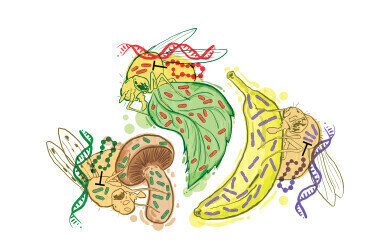-
 Mark Hanson
Mark Hanson -
 Fruit fly experiments show the host immune system is uniquely adapted to common environmental microbes. (Credit: Diego Galagovsky)
Fruit fly experiments show the host immune system is uniquely adapted to common environmental microbes. (Credit: Diego Galagovsky)
News
Specific Genes prevent attack by common Bacteria
Jul 26 2023
Researchers from the Swiss Federal Institute of Technology and the University of Exeter, investigating how specific genes are developed by the immune system to combat common bacteria, have examined how the immune systems of fruit flies are shaped by the bacteria in their food and environment.
Previous theories have suggested that antimicrobial peptides – a kind of natural antibiotics – have a general role in killing a range of bacteria and in this study the researchers found that two peptides each control a single bacterial species commonly encountered by the flies.
“We know that an animal’s food and environment determine the bacteria it encounters,” said Dr Mark Hanson, from the Centre for Ecology and Conservation on Exeter’s Penryn Campus in Cornwall. “This in turn shapes its ‘microbiome’ – the collection of microbes that live in and on its body – and our study shows how immune systems evolve in response to this, to control common bacteria that could otherwise cause harm.
“In immune terms, it proves the saying ‘you are what you eat’ – the flies’ immune systems contain peptides with remarkably specific functions for controlling common bacteria,” he added.
One such bacterium – Acetobacter, found in the fruits that flies eat (and in fruits humans eat) – can harm flies if it escapes the gut and reaches the bloodstream. But the study shows various fly species have a specific peptide (Diptericin B) to control Acetobacter.
“This peptide is the silver bullet that kills this specific bacterium,” Dr Hanson explained. “Without it, flies are extremely vulnerable because Acetobacter is so common in rotten fruit.”
The study also finds evidence of “convergent evolution” – when separate species evolve similar responses to challenges in their environment.
In this case, fly species in the study diverged from a common ancestor about 100 million years ago, yet they both evolved a Diptericin B peptide to control Acetobacter. Meanwhile, closely related fly species that do not feed on fruit have lost their Diptericin B peptides over time, because Acetobacter is no longer common in their environment.
Dr Hanson said this evolutionary process might help to explain human susceptibility to certain infections. “The way our bodies fight infections is really complex. But this sort of research helps us to view our immune system in a new light,” he said.
“I hope it gets us to ask why our immune system is made the way it is. That can help us fight infections, including infections that resist antibiotics. Studies like this produce fundamental observations about life, and in turn these can have crucial applications in the world around us,” he said.
The research was funded by the Swiss National Science Foundation and Novartis Foundation.
The paper, “Ecology-relevant bacteria drive the evolution of host antimicrobial peptides in Drosophila” was published in Science.
More information online
Digital Edition
Lab Asia Dec 2025
December 2025
Chromatography Articles- Cutting-edge sample preparation tools help laboratories to stay ahead of the curveMass Spectrometry & Spectroscopy Articles- Unlocking the complexity of metabolomics: Pushi...
View all digital editions
Events
Jan 21 2026 Tokyo, Japan
Jan 28 2026 Tokyo, Japan
Jan 29 2026 New Delhi, India
Feb 07 2026 Boston, MA, USA
Asia Pharma Expo/Asia Lab Expo
Feb 12 2026 Dhaka, Bangladesh


















